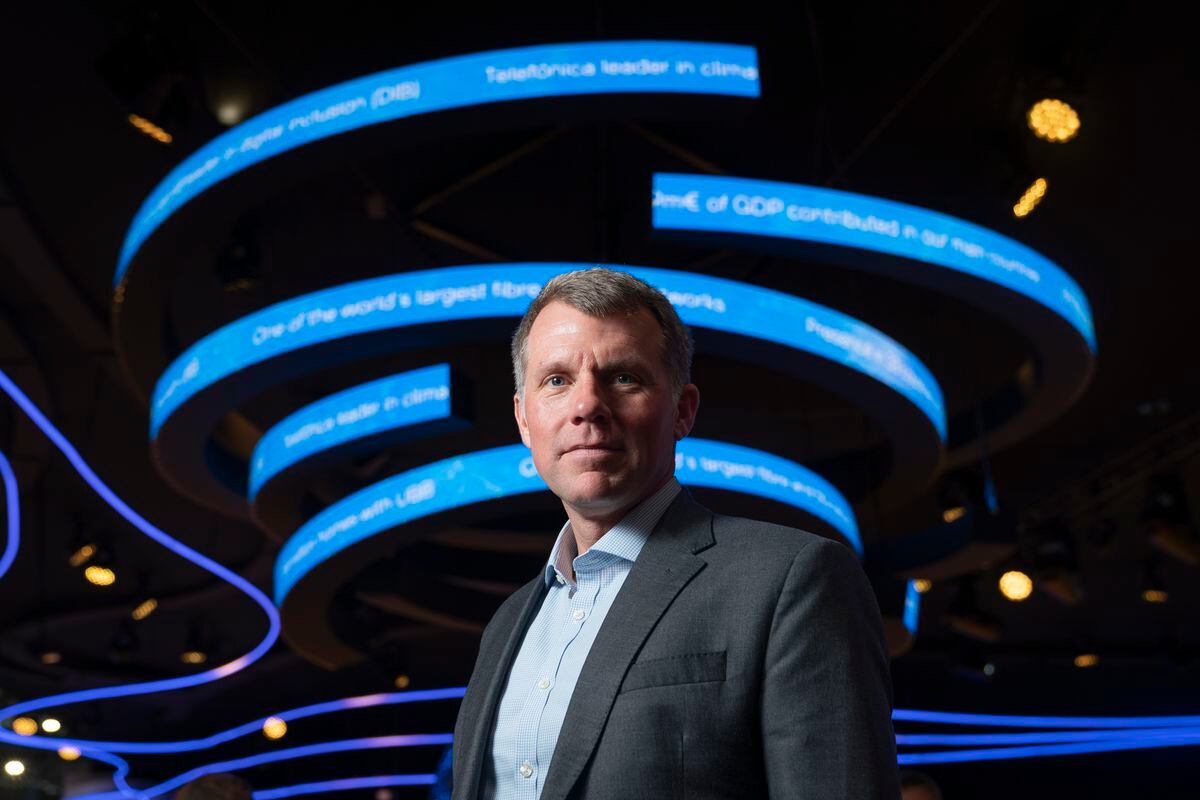The US Ambassador-at-Large on Cyberspace and Digital Policies, Nathaniel Fick, this Tuesday at the Mobile World Congress in Barcelona. Gianluca Battista
He arrives with only 20 minutes to chat, because his activity at the Mobile World Congress (MWC) is frantic.
Nathaniel Fick (Baltimore, 45 years old) is representing the United States Government in this technological event, thanks to his position as ambassador-at-large for cyberspace and digital policies, which he assumed in September.
This bureau of the US State Department was created in April of last year, separating it from the area of economy and business, as a bid by the Biden administration to directly address digital challenges.
Fick, who served as a Marine in Iraq and Afghanistan, published a best-selling book about his experience and ran the cybersecurity software company Endgame.
Now in the Government, and in the MWC, he seeks alliances with countries and companies to provide security for the technologies that will come.
Question:
What are the biggest threats in cybersecurity today?
Answer:
Before coming to the US Government, I spent ten years building and leading global cybersecurity software for enterprises.
And this experience makes me believe that cybersecurity is about having a means to an end.
We need a good level of cybersecurity to enjoy everything we have, for example everything we have at MWC.
This entire digital future depends on maintaining a basic level of trust in our digital ecosystem, and having trust is essential.
But we have governments and criminal groups that are stealing intellectual property and hurting companies;
we have governments and criminal groups that hijack institutions like hospitals and schools for ransom;
and we also have the challenges of digital identity and the difficulties to trust that the people we connect with online are who they say they are.
I think these three are the main challenges.
Q:
Do you think companies are prepared to face these threats?
A:
I think now, in 2023, there is at least a shared understanding that these threats exist.
We understand the threat because we've seen enough bad things happen.
So overall yes, I think digital security is now paramount for all companies, especially the ones at MWC.
Where we need to go now is to organically build security into all the innovations: in 5G networks and in Open Radio Access networks [Open RAN, a structure that allows different open programs to operate, necessary for the deployment of 5G].
We need to secure them from within, rather than when they are already deployed.
Q:
Is collaboration between countries necessary for this?
A:
It is perfectly seen in this congress: all these technologies are intrinsically transnational.
They are transversal.
It doesn't make sense that a phone or technology works in the United States, but that it doesn't work when it lands in Spain, right?
I need it to work everywhere.
That's why we need collaboration between politicians, policy makers, and innovators, to not just make great products and technologies, but to deploy them in a secure, open, interoperable, and trustworthy way.
Q:
What role have cyberattacks played in Ukraine?
A:
Russia's unjustified and unprovoked war in Ukraine is an immense human tragedy, bringing us back to something we have all worked 75 years to avoid.
And it puts cybersecurity again at the top of the agenda.
If anything positive can be drawn, it is the real commitment of the private sector to strengthen Ukrainian cybersecurity: migrating data from the Ukrainian government and companies to the cloud or ensuring satellite and other connectivity so that people can communicate even though the towers or the cables are destroyed under the bombs.
It is a very big challenge, and also a great opportunity: the war has rejuvenated transatlantic relations, and has made some technological challenges that seemed very complicated (such as those being addressed in the EU-US Trade and Technology Council). UU) were simplified.
Q:
Does the US government help Ukraine with its cybersecurity directly?
A:
There is a close collaboration, obviously, between the Ukrainian and US governments, as well as with the private sector and with NATO, to strengthen Ukraine's digital capabilities.
So yes, it was done before the war, and it continues and will continue.
Q:
Cyberattacks play an important role in tensions between countries even when they are not at war, as seen with Russia's actions in several countries.
Is it a form of destabilization?
A:
I believe that nobody wants to return to a fragmented world, we believe in the power of a free, open, interoperable, global and secure internet, which is what allows us to enjoy these technologies.
But there are still 2 billion people who are not connected and do not have these benefits, we want to connect them but in a secure way, so that they can trust that their privacy will be respected.
The geopolitical competition in this regard is just beginning, and it is important that we establish long-term rules.
To do that, I think it has to be inclusive, not just between governments but also with companies and civil society, who have to act as watchdogs to keep governments and big business honest.
I think there are some governments that think like this, like ours,
You can follow
EL PAÍS Tecnología
on
and
or sign up here to receive our
weekly newsletter
.
Subscribe to continue reading
Read without limits
Keep reading
I'm already a subscriber

